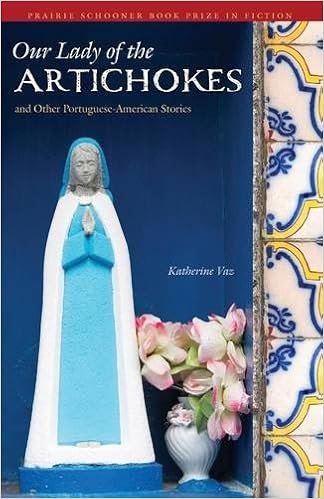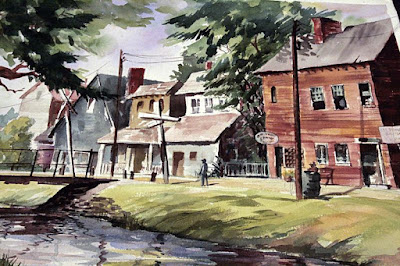December 5 - Katherine Vaz, "The Mandarin Question"
Choose either.
1. What is the function of the Mandarin Question in this story?
2. Pick up your favorite turn of phrase or rhetoric device. Try to explain honestly why it resonates with you.
3. We have studied plenty of stories about masculinity. To what extent can this be considered a story about feminitiy?
1. What is the function of the Mandarin Question in this story?
2. Pick up your favorite turn of phrase or rhetoric device. Try to explain honestly why it resonates with you.
3. We have studied plenty of stories about masculinity. To what extent can this be considered a story about feminitiy?



2. Although this phrase appears simple, it has depth due to rhetorical devices, imagery, and meaning. The simplicity, however, contributes to the beauty of this phrase. You need to take time to study it in order to truly appreciate it. When you first read it, the phrase is pretty. It sounds nice, and it avoids cliches; this particular string of words has never before been strung together, and that is part of the appeal to this phrase. But it goes beyond being simply pretty; it is also beautiful because of the depth of its significance. Although the image of flakes of dandruff falling off someone’s head and the idea of men feeding on women’s scalps is hard to romanticize, Vaz accomplishes this by tying it to the concepts of continuity, life and death, the afterlife, and the connection between these things. This phrase is written within the context of the advice that the nuns in Catholic school gave Faye: Remember, man, that you are dust! A reminder to have humility and to keep things in perspective, for you will turn into dust in the end. This phrase resonates with me for these reasons. It is simple yet complex, ugly yet beautiful, and both literal and figurative.
ResponderExcluir"and when we ran our hands through our
Excluirhair men fed on our scalps" -- this is the phrase to which I was referring; I forgot to write it at the top of my comment.
Sarah Kurzweil
ResponderExcluirIn this story, the Mandarin Question serves as a way to help the narrator overcome her issues with men and find love. Because her father killed her mother, the narrator appears to spend the first part of her life fearing relationships and love. She describes how when she and her friend Lisa Gonsalves “ran [their] hands through [their] hair men fed on [their] scalps” (106). And, by the time the narrator turned twenty, she “was still a virgin” (108). The first strong romantic feelings that she has are for Brian McClintock. When she discovers that Brian’s relationship with her mother angered her father and caused him to shoot her mother, her fear of falling in love with a man—particularly one who has experienced so much suffering and has “come back from the dead” after a past love— only grows (112). The test of the Mandarin Question, which Evan Redken originally presents, however, helps the narrator confront her fear. When she asks Henry Dunne the Mandarin Question—which she says “was a test of who someone was in this world and how he’d be in the next, and if he’d cherish you whether you were visible or invisible” — his answer satisfies her and allows her to embrace him, despite the fact that he was a soldier home from Iraq who has experienced suffering (112). In the same way that the narrator’s answer to the Mandarin Question touched and saved Mr. Redken, Henry’s answer touches the narrator and highlights an important theme in this short story: the way in which touch and music bring people to life. Just like how Tia Clara’s touch brought the narrator to life when she was born prematurely, by embracing Henry, the narrator cuts “through the terror binding and darkening his muscles” and brings a “glowing, light as the touch of a newborn, come back to life to love” her (113). The Mandarin Question also challenges readers to think about the way in which the world is connected because it makes a person think about the impact of his or her actions in a completely different part of the world. Because Katherine Vaz is a Portuguese-American writer, including this idea in her writing likely serves as her effort to force readers to think about the ways in which people welcome and care for those from other cultures.
In response to question 2: I really appreciated a phrase toward the end of the story, which reads "In my empty home I came all to pieces in his arms and he did in mine, and then we pasted the both of us back together to form one porcelain urn" (112-113). At face value, this sentence can be interpreted as a metaphor for falling in love; for exposing your vulnerabilities to someone and allowing yourself to become a part of them. But at a deeper level, this sentence speaks to the narrative thread about death which runs throughout the story. Shortly before this phrase, the Iraq soldier answers the Mandarin Question by arguing that "We're all bell ringers" (112). What he means is that we all steal from others at a distance in order to achieve prosperity for ourselves, and in doing so we cause the (metaphorical) death of everyone around us. When viewed in this context, the phrase about the main character and the soldier pasting themselves together to form one urn takes a new meaning. It seems to suggest that they are uniting themselves so that they can receive death (like an urn receives the ashes of the deceased) together. They accept the fact that they will be stolen from, and "killed" by all the "bell ringers" of the world, but they find solace in the fact that they will do it together. I found this deeper meaning to be really beautiful because it highlights the power of love in a seemingly hateful world.
ResponderExcluir“The Mandarin Question” details several aspects of the female persona through the main character, Faye, and portrays how her femininity guides her through her relationships with men. The first two instances of femininity deal with a woman’s individuality and strength, as Faye is forced to fight through the adversity of losing her mother to murder by her father on the day of her birth, and immediately losing a key maternal figure in her life. This void is partially filled by her mother’s sister, who takes care of her, and is described as being the one that saved this girl’s life. The next part shows the suffering and strength of Tia Clara, the Faye’s caretaker, following the death of her brother in Afghanistan. Moreover, an ideal image of feminism is present in the environment in which the girl grows up in, as a portrait of Saint Rita hangs from a room in the house above them. Further, the story discusses the topic of virginity, a common element in the topic of femininity, and then quickly brings the story back to Faye’s deceased mother. Faye’s identifies with her mother’s appearance and traces her routes back to her mother and her aunt. In like manner, the detachment from her father and attachment to her mother’s family is evident by Faye’s surname of Silva, not McSweeney.
ResponderExcluirIn her adult life, she takes the job of a nurse, and is assigned to take care of a widower who is dying of cancer, Her role of caretaker and nurturer here parallels the roles of the other prominent women in her life, specifically Tia and her aunt. Faye stays with him in what is believed to be his final days, which he is very grateful for. Shortly thereafter, the doctors announce the man’s cancer is in remission, and his life is saved. Faye believes her presence and praying played a part in the man’s survival, just as the presence of her aunt, she believes, was instrumental in her savior. Subsequently, she admits that it was at this point that she realized “everyone is a child of mine”, which alludes to another theme in femininity, maternity.
The actions taken by the men in her life have left Faye cautious of her alliances with them. She is reminded of the terror inflicted on her mother by her father every day, and can clearly see the emotional torment Tia Clara goes through following the death of her brother. In an action that indicates her fear of the possibility of a man causing her pain, Faye runs away from a soldier at a bar after she begins talking to him. This man, Henry Dunne, catches up with her later, and eventually calms Faye's fears as they begin a relationship, which finally fills the void in her life.
Katherine Vaz’s “The Mandarin Question” was full of original, emotive language that forced me to continually pause, contemplate, and be introspective. The phrase that resonated the most with me was “I soothed them, although of course they stayed the same, because even his house loved him so much it wanted to suffer as he did”(Vaz, 110), because of its conciseness and personal relevancy. In this sentence, Vaz combines personification with powerful diction to succinctly describe the relationship that Mr. Redken has with his house. This phrase immediately caught my attention because Vaz flips the cliché of a family caring for and loving its house and instead offers an interpretation of the house’s love for the owner. This phrase left a lasting impression on me due to the literal and figurative bearing it has on my life. At a basic level, I was reminded of my own home that I have lived in my whole life, which mirrors my tendencies and imperfections the same way Mr. Redken’s house did for him. However, beyond this surface-level connection, Faye’s decision to soothe the walls in vain forced me to consider how often the people in my life irrationally try to do the something because they feel they should, not because they think their actions will actually improve a situation. If you make an effort to do something for another person full well knowing that your contribution will not help them, are you doing it for them, or are you doing it so that you feel less guilty about their predicament?
ResponderExcluir-Shrenik
"You probably have plenty besetting you without worrying if your dinner got a serenade," is the phrase I found most interesting in the piece. I found the entire paragraph about animals being serenaded before slaughter very odd but thought provoking. Here, Vaz makes the conscious decision to address the reader. In a story that revolves around death, Vaz pulls beauty from it, and with this address to the reader, makes this sort of romanticization of death universal. There's a direct connection between the way the character uses music to cope with the death of her mother, to the animal using music to cope with its own death, and finally to the reader ingesting the serenaded meat to cope with his or her own death. "It's plain biology," claims Vaz. It's sort of an uncomfortable metaphor, and an odd way to beautify the fear of death, but I think that's what makes it resonate with me so much. It caught my attention and it made me think.
ResponderExcluirThe phrase that really stuck out to me was “I put down my violin and stayed where he could hold me fiercely, where I could feel my notes imbedded within him, cutting through the terror binding and darkening his muscles” (113). This phrase really resonated with me because of the whole concept of dark-cutting, and how powerful certain human relationships and interactions can be. I’ve heard about the concept of dark-cutting before, and it’s something that I’ve experienced first-hand. However, the thing that stuck out to me from this story was the protagonist’s ability to prevent this “darkening of meat”. Of course, her job was to do so with her violin, but she seemed to possess this power with other human beings as well. For the cows, her violin created a trance that took them away from the stress that comes with being near to death. For the old widower, her touch and genuine good character seemed to give him a second wind at life. For the soldier, her love and song took him away from “the terror binding and darkening his muscles”. The soldier must’ve gone through a tremendous amount of stress being in war, and this phrase seemed to wrap all the different stories and metaphors in this tale into one. This direct contact, which is connected to how she survived as a premature baby through the touch of her aunt’s hands, is the thing that prevented the darkening of these characters, and pushed them to “want to hang on a bit longer” (109). This was very powerful in my opinion, and wrapped the story up well by connecting all the events in her life.
ResponderExcluirAndres Gonzalez
Response by Rebecca Hollister
ResponderExcluir2. One phrase that really resonated with me was “the animals had learned a thing or two somehow and would now be passing it on to their unborn.” I really think that the slaughterhouse scenes at the beginning of the story are fascinating particularly because of the author’s later invoking of Iraq and Afghanistan, where it could be argued that soldiers went just to be slaughtered. I also think the inclusion of music in the story is interesting especially in terms of this phrase. Earlier the narrator describes her violin as a creature that is crying, and though most people think of music to be a positive, beautiful thing, here the creatures are terrified when they hear it. It is also unusual that they are terrified because they themselves have never experienced the slaughterhouse before, and those who had couldn’t pass it on to the others through any tangible form of communication. This makes the fact that music is so terrifying to the cow even more disturbing, because if this idea is even the slightest bit literal rather than metaphorical, it means that humans have spread their impact to an entire species in this area. Finally, I think this phrase is interesting because it mirrors the experience at the end of the story: while here music leads the cows to their deaths and is one of the last things they experience, at the end of the story it seems like the veteran is brought back to life in part because of the music the narrator plays.
Bryan Schaffer
ResponderExcluirThe phrase that resonated with me most came at the end of the first paragraph. Faye initially explains how her aunt saved her life when she was a newborn, simply by holding her, after which she states, “They come gloveless for me now, in daylight and at nighttime.” (105) In essence, this is Faye’s way of saying that a life is only made worthy by the people around you. The “gloveless” hands that hold her now are the people she loves that allow her to keep going. The significance of this phrase comes up throughout the story. When Evan Redken tells Faye to hold him, he symbolically tells her, “you make me want to hang on a bit longer.” (109) Faye’s touch is giving him the strength to push forward. Furthermore, I found “in daylight and at nighttime” to have a double meaning. In one sense, Faye is saying that she needs people in her life in good times and in bad. Comfort is always necessary, not just in moments of pain. In another sense, Faye is tying this phrase directly to her interpretation of the Mandarin Question, specifically later in the story, when she refers to the riddle as a test of “if he’d cherish you whether you were visible or invisible.” (112) Faye is arguing that in order for humans to live fulfilled lives, they need to care for those they cannot always see. If they simply care for themselves, then they have failed the riddle. The phrase resonates with me because I agree with its sentiment. The double meaning is also a way to allow for multiple interpretations from the reader.